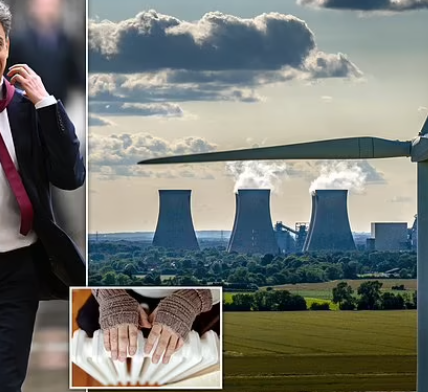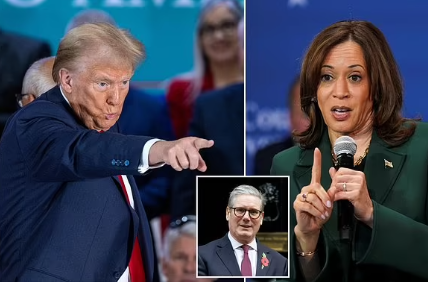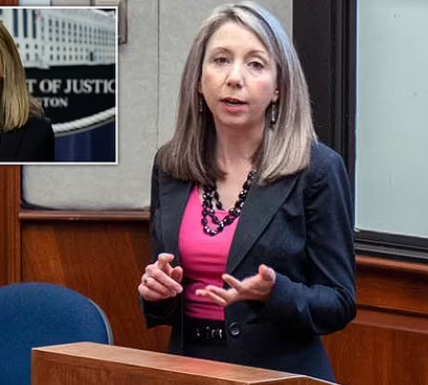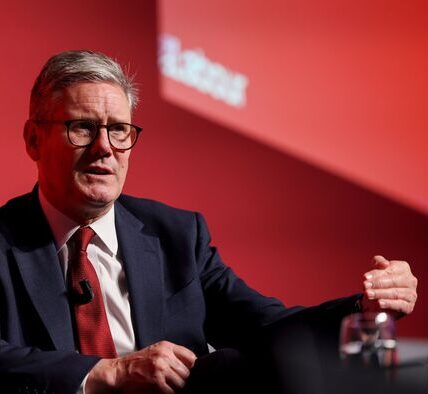Labour’s borrowing costs surge ‘worse than Liz Truss chaos’: Rachel Reeves faces spending crisis after interest rates hit 27-year high on fears of ‘Stagflation’_Nhy
Rachel Reeves has been warned that the spike in UK borrowing costs is worse than the crisis that ended Liz Truss‘s premiership.
The interest rate on 30-year gilts – the government’s long-term financing vehicle – approached 5.25 per cent yesterday, the highest level for 27 years.
The surge heaps pressure on the Chancellor’s spending plans, which were already seen as tight despite her huge Budget tax raid.
Treasury official have been insisting that meeting the government’s fiscal rules – including balancing the government’s day-to-day spending budget by 2030 – is ‘non-negotiable’.
However, her headroom looks to hve been all-but wiped out, potentially leaving Ms Reeves choosing between spending cuts and more tax rises – even though she previously pledged that the latter will not happen.
Although the rise has been slower than the response to the mini-Budget in 2022 – and rates have been surging around the globe – analysts sounded alarm that the picture is ‘more dire’ now and the mood on markets is ‘darker’.

Rachel Reeves has been warned that the spike in UK borrowing costs is worse than the crisis that ended Liz Truss ‘s premiership

The interest rate on 30-year gilts – the government’s long-term financing vehicle – approached 5.25 per cent yesterday, the highest level for 27 years
Sunaina Sinha Haldea of financial services firm Ramond James told the BBC Radio 4 Today programme there were concerns that inflation was ‘sticky’ even as growth stalls – known as ‘Stagflation’.
She said that was ‘viewed very poorly’ in the markets because the Bank of England would be unable to use its ‘most potent tool’ to revive activity, cutting interest rates.
‘So there’s no impetus to spur the economy into a growth mode. And markets are concerned that will absolutely cost the UK in terms of its economic outlook,’ she said.
‘It’s interesting to note that these interest rate costs if we sustain them at the nearly 5.25 per cent it hit on Tuesday it erases the room for extra borrowing that he Chancellor and this government would like to set in its own Budget rules and it needs to do in order to enact its own growth plans.
Asked whether the situation was worse than 2022, the economist said: ‘The mood music around the UK is different this time around because with Liz Truss there was an expectation that it would come back to correction because the government would change.
‘There isn’t this time around. So this time around the concern is a lot more real, and also the threat of tariffs from Trump could increase long term price pictures and price pressures in the UK in a way that’s quite fundamental.
‘Certainly this time around the concern is more dire and the mood is darker.’
Ms Reeves announced at the Autumn fiscal package that she was ramping up borrowing for more public spending and changing debt rules to boost investment.
However, UK plc has since showed signs of stalling with businesses warning of price rises and job cuts due to the extra burden.
Shadow chancellor Mel Stride said the rise in gilt yields was ‘yet more evidence Labour have driven our economy into a ditch’.
He said: ‘They talked it down. They taxed the life out of it. They’ve racked up borrowing. They killed growth. Now we are all paying the price with higher inflation, fewer jobs and lower wages.’

Although the rise has been slower than the response to Liz Truss’s (pictured) mini-Budget in 2022 – and rates have been surging around the globe – analysts sounded alarm that the picture is ‘more dire’ now and the mood on markets is ‘darker’
SEE MORE:
Will YOUR child’s school have to cut teacher pay? Fury at Labour’s ‘wrecking ball’ bid to force academies to follow national salary scales and curriculum in ‘return to mediocracy’
Academy schools face having to cut the pay of their top teachers under Labour plans branded ‘educational vandalism by critics.
The government is making sweeping changes to reforms brought in by the Tories, including massive curbs on the independence of state schools.
The Children’s Wellbeing and Schools Bill, which will be debated by MPs today, will end academy freedoms over teachers’ pay, recruitment and the curriculum.
It will also restrict the ability of good schools to expand – and even give Whitehall powers to regulate school uniforms – which ministers say will cut costs.
The Tories warned the Bill was a ‘highly ideological, un-evidenced onslaught on school freedoms’ that would drive down school standards.
Writing in today’s Mail, shadow education secretary Laura Trott warns that the proposals – designed to make the education system more consistent – will make more schools ‘consistently bad’.
And she accuses Labour of wanting to keep their union barons happy ‘at the expense of pupils receiving a good education’.
However Education Secretary Bridget Phillipson told LBC: ‘I think the only vandals here are the people that today intend to vote down the single biggest piece of child protection legislation. They are the vandals.’

Writing in today’s Mail, shadow education secretary Laura Trott warns that the proposals – designed to make the education system more consistent – will make more schools ‘consistently bad’

However Education Secretary Bridget Phillipson told LBC: ‘I think the only vandals here are the people that today intend to vote down the single biggest piece of child protection legislation. They are the vandals.’

Ms Trott writes that Education Secretary Bridget Phillipson ‘is our very own Miley Cyrus, swinging in on her wrecking ball (pictured), and undermining the consensus built over two decades – between successive governments of all parties – that has driven improvements in our schools’.
She added that she disagreed with the chief executive of the Confederation of School Trusts that proposed legislation would make it harder for schools to improve.
Academies – which are independent of local authorities – currently have the freedom to set their own pay and conditions for staff, and some academies exceed the national pay scales for teachers. Around 80 per cent of secondary schools and 40 per cent of primary schools are academies or free schools.
But under the new legislation, all teachers will be part of the same core pay and conditions framework whether they work in a local authority-run school or an academy.
Tens of thousands of teachers who work in academies which exceed the national pay scales could have their benefits and remuneration put at risk by the new law when it comes into effect, the Tories said.
The Bill will also require all state schools – including academies – to teach the national curriculum, and also end academies’ ability to hire teachers – such as from overseas – who do not have Qualified Teacher Status.
It will also allow councils to open new schools which are not academies, and it will end the forced academisation of schools run by local authorities which are identified as a concern by Ofsted.
Ms Trott writes that Education Secretary Bridget Phillipson ‘is our very own Miley Cyrus, swinging in on her wrecking ball, and undermining the consensus built over two decades – between successive governments of all parties – that has driven improvements in our schools’.
‘It will be a return to mediocracy: taking away school freedoms over pay, curriculum and staffing, and no solution for failing schools. It is nothing less than vandalism of our world-leading education system.’
Tory MP Neil O’Brien, the shadow education minister, branded the Bill ‘a disaster’.
He said: ‘I have worked in politics for 25 years and it is one of the most dumb and tragic things I can remember. It’s an act of pure vandalism, abolishing academies in all but name.’

Prime Minister Keir Starmer and Education Secretary Bridget Phillipson speak with children at Perry Hall Primary school in Orpington, during the first day of the new school year, on September 2, 2024 in London
The Conservatives will table a reasoned amendment to the Bill today, when MPs will debate it at second reading, rejecting the legislation.
Leora Cruddas, chief executive of the Confederation of School Trusts (CST), warned that ‘some of the proposals in this bill could reduce school trusts’ abilities to respond to local circumstances and keep on making the improvements needed so that children can get the best chance in life’.
‘The Bill potentially risks making it harder for schools to improve by tying the hands of teachers and school leaders,’ she said.
‘Instead we need to ensure that the Bill creates a system that enables teachers and leaders in all types of schools to do what is best for children.’
The measures on academies are contained among plans to require all councils to hold a register of children who are not in school. The Bill also contains measures to give every child a unique number and remove the automatic right for parents to educate children at home.
Education Secretary Bridget Phillipson said last night: ‘Keeping children safe will always be my first duty as education secretary, but we can only truly do that if we know where our children are. The sad reality is that at the moment there are thousands of children hidden from sight.
‘This government will make no apologies for doing whatever is necessary to keep children out of harm’s way, and I will not stand by while some young people fall through the cracks, left without a good education and vulnerable to exploitation and abuse.
‘This landmark Bill is a crucial step forward in our mission to protect all children, while also supporting parents by putting more money in their pockets as we deliver our Plan for Change and give all children the best start in life.’
A Labour spokesman said: ‘It is appalling that the Conservatives are attempting to block this government’s plans to keep the most at-risk children in our country safe from harm.
‘On Wednesday, Conservative MPs have a choice to back our measures to protect children from grooming, exploitation and abuse, instead of playing politics with the safety of vulnerable children.’




